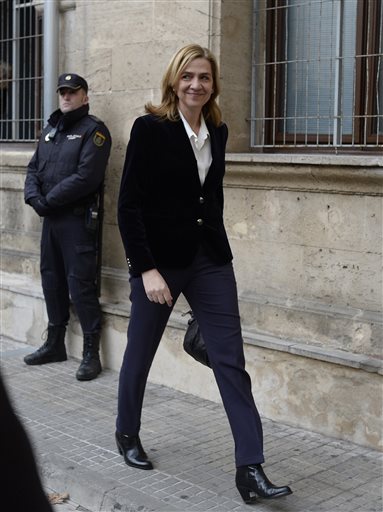
By ALAN CLENDENNING
A Spanish judge on Monday ordered the king’s sister, Princess Cristina, to be tried along with her husband on tax fraud charges — making her the first member of the country’s royal family to face charges in court since the monarchy was restored in 1975.
Judge Jose Castro went against a prosecutor’s Dec. 9 recommendation that Cristina should be fined and her husband, Olympic handball medalist turned businessman Inaki Urdangarin, should be tried.
Castro set bail for her at 2.7 million euros ($3.3 million) and 15 million euros for her husband. If convicted, the 49-year-old Cristina could face up to four years in prison. Her lawyer, Miquel Roca, told reporters he would appeal the decision.
“It’s a surprise to all of us and especially her,” he said.
Probing suspected abuse of company funds to cover the couple’s expenses from the Aizoon real estate and consulting firm Cristina co-owned with her husband, Castro compiled detailed lists of alleged examples — including purchases for their Barcelona mansion, salsa dancing classes and vacations at luxury hotels.
The legal troubles of King Felipe VI’s sister during the four-year probe seriously damaged the Spanish monarchy’s image and were seen as extreme examples of royal excess as unemployment rose sharply and the Spain’s economy nose-dived in 2012.
The case centers on allegations that Urdangarin used his Duke of Palma title to embezzle about 6 million euros ($7.4 million) in public contracts through the Noos Institute, a nonprofit foundation he set up with a business partner. The Institute allegedly channeled money to other businesses, including Aizoon.
Cristina denied knowledge of her husband’s activities in February during an unprecedented appearance before Castro to answer questions.
Prosecutor Pedro Horrach recommended charges for Urdangarin carrying a possible sentence of 19½ years in prison, but said Cristina should not be indicted but ordered to pay 580,000 euros ($711,000) to cover the amount she could have profited from because of her husband’s alleged illegal dealings.
Castro had the option of accepting Horrach’s recommendations or sending Cristina to be tried by a different judge. The case will probably go to trial at the end of 2015 in Palma de Mallorca in Spain’s Balearic Islands, where most of the alleged offenses occurred.
She and her husband moved to Switzerland in 2013, where she works for the foundation of Spain’s La Caixa bank, which finances charitable and cultural programs.
Cristina’s brother Felipe, 46, became king in June when his father Juan Carlos abdicated after a four-decade reign. Juan Carlos said it was time for new royal blood to take over, but his popularity was extremely low after he went on an elephant-hunting trip to Botswana in 2012 at the height of Spain’s financial crisis.
Juan Carlos apologized to Spaniards soon after on live TV.
Felipe pledged to restore public trust in the monarchy. Cristina and her sister, Princess Elena, are no longer official members of the royal family, and he has also limited the gifts that members of the royal household and employees may accept. The household’s accounts are now subject to external audits which are made public.
Cristina’s case is going forward because Spanish law allows groups to file charges when officials don’t. Her case was driven forward by the anti-corruption group Manos Limpias (Clean Hands).
Polls have shown that Felipe is Spain’s most popular public figure. But his efforts to restore credibility to the monarchy could be undercut by his sister’s legal troubles and a high probability she will end up on trial along with 15 others accused of participating in the scheme.
“She is probably going to trial and it will be totally public. Everyone will be able to see it,” said Ignacio Sanchez, a Madrid-based lawyer for Hogan Lovells International LLP who specializes in white collar crime and fraud. “This was the worst news she could have received.”



